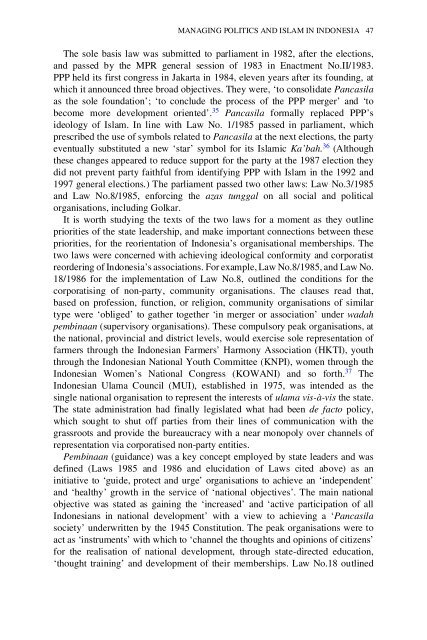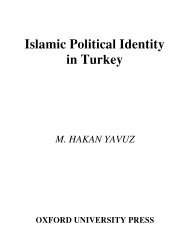Create successful ePaper yourself
Turn your PDF publications into a flip-book with our unique Google optimized e-Paper software.
MANAGING POLITICS AND ISLAM IN INDONESIA 47The sole basis law was submitted to parliament <strong>in</strong> 1982, after the elections,<strong>and</strong> passed by the MPR general session of 1983 <strong>in</strong> Enactment No.II/1983.PPP held its first congress <strong>in</strong> Jakarta <strong>in</strong> 1984, eleven years after its found<strong>in</strong>g, atwhich it announced three broad objectives. They were, ‘to consolidate Pancasilaas the sole foundation’; ‘to conclude the process of the PPP merger’ <strong>and</strong> ‘tobecome more development oriented’. 35 Pancasila formally replaced PPP’sideology of <strong>Islam</strong>. In l<strong>in</strong>e with Law No. 1/1985 passed <strong>in</strong> parliament, whichprescribed the use of symbols related to Pancasila at the next elections, the partyeventually substituted a new ‘star’ symbol for its <strong>Islam</strong>ic Ka’bah. 36 (Althoughthese changes appeared to reduce support for the party at the 1987 election theydid not prevent party faithful from identify<strong>in</strong>g PPP with <strong>Islam</strong> <strong>in</strong> the 1992 <strong>and</strong>1997 general elections.) The parliament passed two other laws: Law No.3/1985<strong>and</strong> Law No.8/1985, enforc<strong>in</strong>g the azas tunggal on all social <strong>and</strong> politicalorganisations, <strong>in</strong>clud<strong>in</strong>g Golkar.It is worth study<strong>in</strong>g the texts of the two laws for a moment as they outl<strong>in</strong>epriorities of the state leadership, <strong>and</strong> make important connections between thesepriorities, for the reorientation of <strong>Indonesia</strong>’s organisational memberships. Thetwo laws were concerned with achiev<strong>in</strong>g ideological conformity <strong>and</strong> corporatistreorder<strong>in</strong>g of <strong>Indonesia</strong>’s associations. For example, Law No.8/1985, <strong>and</strong> Law No.18/1986 for the implementation of Law No.8, outl<strong>in</strong>ed the conditions for thecorporatis<strong>in</strong>g of non-party, community organisations. The clauses read that,based on profession, function, or religion, community organisations of similartype were ‘obliged’ to gather together ‘<strong>in</strong> merger or association’ under wadahpemb<strong>in</strong>aan (supervisory organisations). These compulsory peak organisations, atthe national, prov<strong>in</strong>cial <strong>and</strong> district levels, would exercise sole representation offarmers through the <strong>Indonesia</strong>n Farmers’ Harmony Association (HKTI), youththrough the <strong>Indonesia</strong>n National Youth Committee (KNPI), women through the<strong>Indonesia</strong>n Women’s National Congress (KOWANI) <strong>and</strong> so forth. 37 The<strong>Indonesia</strong>n Ulama Council (MUI), established <strong>in</strong> 1975, was <strong>in</strong>tended as thes<strong>in</strong>gle national organisation to represent the <strong>in</strong>terests of ulama vis-à-vis the state.The state adm<strong>in</strong>istration had f<strong>in</strong>ally legislated what had been de facto policy,which sought to shut off parties from their l<strong>in</strong>es of communication with thegrassroots <strong>and</strong> provide the bureaucracy with a near monopoly over channels ofrepresentation via corporatised non-party entities.Pemb<strong>in</strong>aan (guidance) was a key concept employed by state leaders <strong>and</strong> wasdef<strong>in</strong>ed (Laws 1985 <strong>and</strong> 1986 <strong>and</strong> elucidation of Laws cited above) as an<strong>in</strong>itiative to ‘guide, protect <strong>and</strong> urge’ organisations to achieve an ‘<strong>in</strong>dependent’<strong>and</strong> ‘healthy’ growth <strong>in</strong> the service of ‘national objectives’. The ma<strong>in</strong> nationalobjective was stated as ga<strong>in</strong><strong>in</strong>g the ‘<strong>in</strong>creased’ <strong>and</strong> ‘active participation of all<strong>Indonesia</strong>ns <strong>in</strong> national development’ with a view to achiev<strong>in</strong>g a ‘Pancasilasociety’ underwritten by the 1945 Constitution. The peak organisations were toact as ‘<strong>in</strong>struments’ with which to ‘channel the thoughts <strong>and</strong> op<strong>in</strong>ions of citizens’for the realisation of national development, through state-directed education,‘thought tra<strong>in</strong><strong>in</strong>g’ <strong>and</strong> development of their memberships. Law No.18 outl<strong>in</strong>ed




